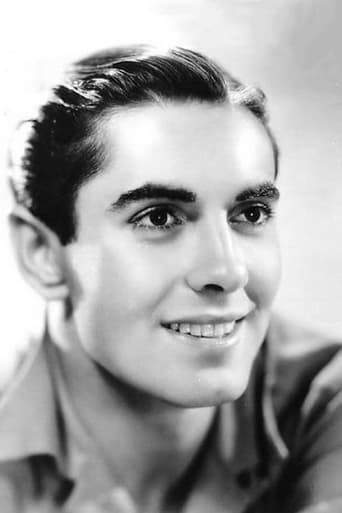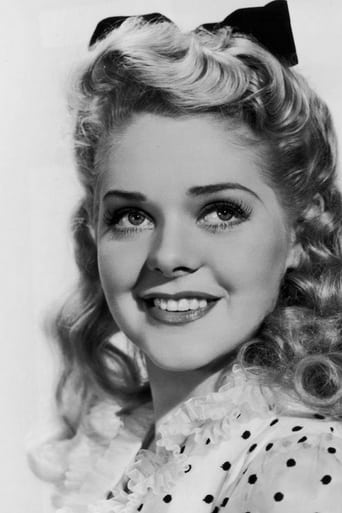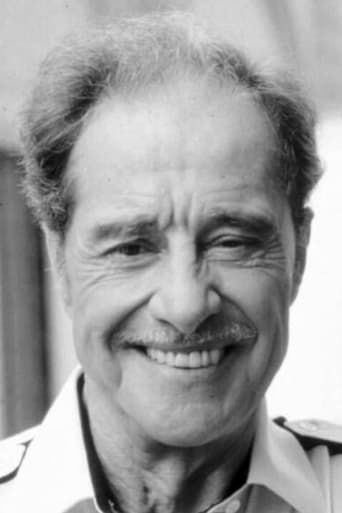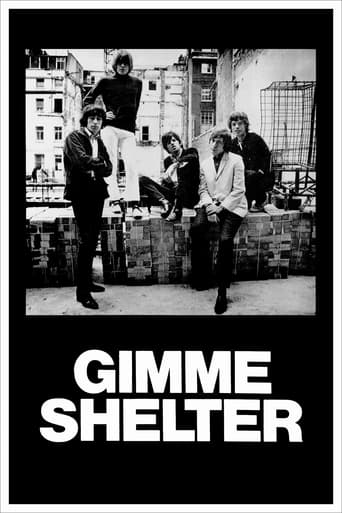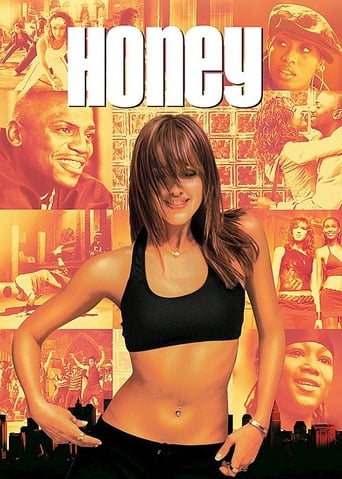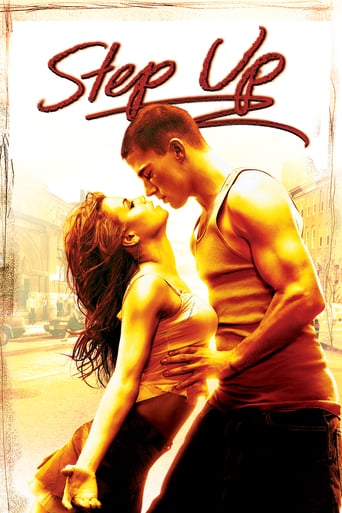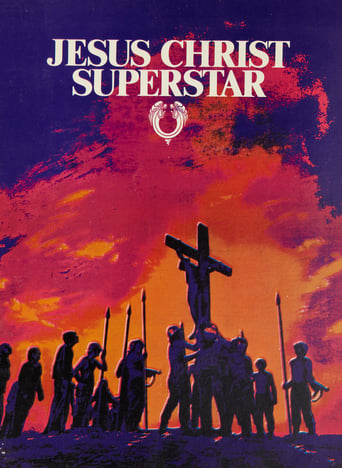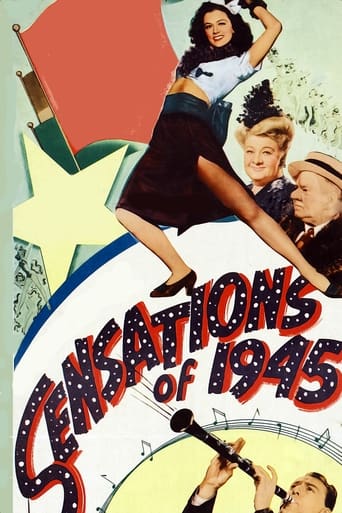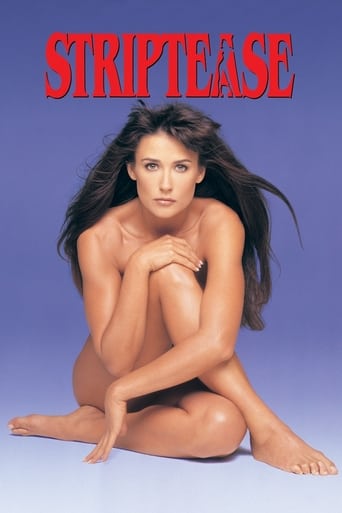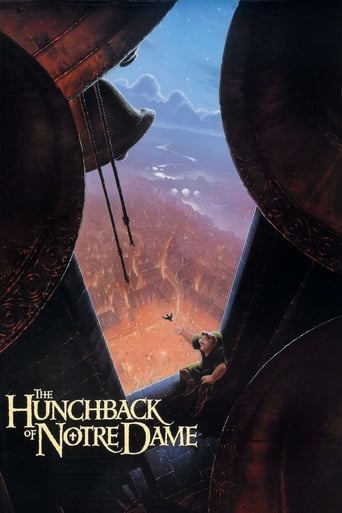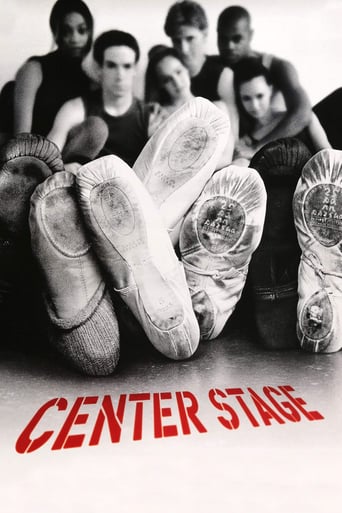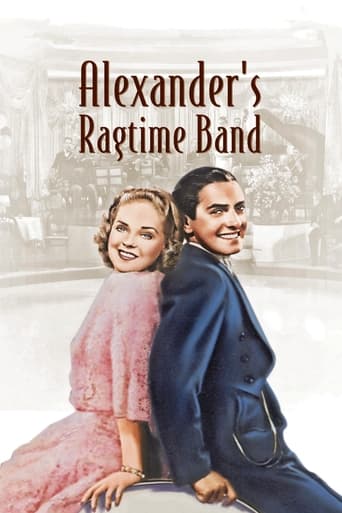
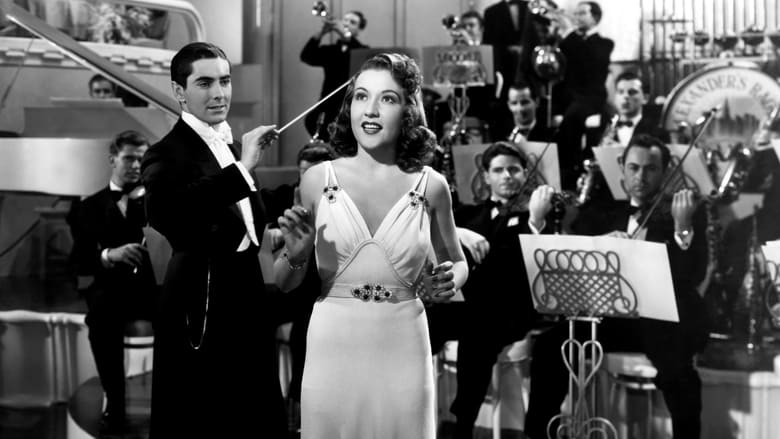
Alexander's Ragtime Band (1938)
Classical violinist, Roger Grant disappoints his family and teacher when he organizes a jazz band, but he and the band become successful. Roger falls in love with the band's singer, Stella, but his reluctance to lose her leads him to thwart her efforts to become a solo star. When the World War separates them in 1917, Stella marries Roger's best friend and, when Roger returns home after the war, an important concert at Carnegie Hall brings the corners of the romantic triangle together.
Watch Trailer
Cast


Similar titles
Reviews
It's no definitive masterpiece but it's damn close.
As Good As It Gets
A lot of fun.
It’s sentimental, ridiculously long and only occasionally funny
Copyright 11 August 1938 by 20th Century-Fox Film Corp. New York opening at the Roxy, 5 August 1938. U.S. release: 19 August 1938. Australian release: December 1938. 9,569 feet. 106 minutes. (Available on a superb 20th Century Fox DVD).NOTES: Won the award for Best Adapted Music Score: Alfred Newman (defeating Carefree, Girls School, Goldwyn Follies, Jezebel, Mad About Music, Storm Over Bengal, Sweethearts, There Goes My Heart, Tropic Holiday and The Young In Heart). Although Newman was the one who received the statuette, all he did was conduct the orchestra. The actual scoring was done by a team of eight arrangers, including Herbert Spencer, Gene Rose and Edward B. Powell.Also nominated for Best Picture (defeated by You Can't Take It With You), Original Story (lost to Boys Town), Art Direction (lost to The Adventures of Robin Hood), Film Editing (Robin Hood was again the winner), and Best Song (Berlin's "Now It Can Be Told" was edged out by Rainger and Robin's "Thanks For the Memory" from The Big Broadcast of 1938).Number 3 on the annual poll of U.S. film critics conducted by The Film Daily. COMMENT: No less than 26 fabulous songs by Irving Berlin, old and new (including "Now It Can Be Told", "My Walking Stick", "Alexander's Ragtime Band", "I'm Marching Along with Time" and the impressive production number, "We're on Our Way to France"), splendidly performed by such mistresses of melody as Alice Faye and Ethel Merman, are ingeniously threaded on a show biz story concocted by Berlin himself. Unfortunately, Mr Berlin's plot is the weakest link in the chain and its corn-ball clichés have an irritating tendency to get in the way of and to over-shadow his wonderful tunes. Despite the array of writing talent, the script has very little in the way of real dramatic "meat" for the players to get their teeth into, and whilst Alice Faye and company look very decorative, one wishes they had something more substantial to do.Henry King's direction is capable and Peverell Marley's photography a thing of beauty. The art directors have excelled themselves in creating attractive sets, the costumes are gorgeous and production values are generally lavish (though the choreography of the musical numbers is rather tame, especially to those of us who thrill to the spectacle of a Busby Berkeley production number); but 26 songs are not enough to sustain a story so slight and so silly. Now if it was 36 songs . . . Alfred Newman won a deserved award for his fine scoring of Berlin's music. The film itself was nominated for the Best Picture award, but lost out to "You Can't Take It With You."OTHER VIEWS: A feast for Irving Berlin fans. And who better to put over his catchy rhythms and sparkling melodies but Ethel Merman and Alice Faye. Both ladies are in top voice. Berlin wrote three new songs for the movie, including one each for Merman ("My Walking Stick") and Faye ("Now It Can Be Told" — which was nominated for a prestigious Hollywood award). He then went on record to compliment Faye by saying, "I'd rather have Alice Faye introduce my songs than any other singer I know." Good on you, Irving! This critic totally agrees. Alice Faye is the most marvelous wonder to hit movies since Georges Melies sent a man to the moon. And Alexander's Ragtime Band is a sensational showcase for her talents. She sings, she dances, she looks absolutely beautiful, she delivers even the most clichéd of lines with such entrancing inflections of voice as to conjure freshness and vitality from the feeblest threads. And when she sings . . . Not all the angels in all the heavens could produce notes so rhapsodic and true. — JHR writing as George Addison.
One composer stands above the rest in his plethora of famous songs still sung today. Mr. Irving Berlin's tunes are sung at Christmas, Easter, baseball games, Fourth of July ceremonies and award shows. His Broadway book shows are few, but even though the voice has been silenced, the melody still lingers on. Half a dozen movies catalog his various hits, and this is the best. It covers the early 20th Century through pre-World War II, and even though the stars never age throughout, they are a metaphor for each song of Berlin's that do not age, either.The handsome Tyrone Power is the leader of a ragtime band, and Alice Faye is the rough-and-tough broad who becomes their star before moving onto Broadway where as a lady, she is the biggest diva on the boards. After a mistake of a marriage to their pal Don Ameche, she strikes out on her own while Power goes onto entertaining in World War I in Berlin's real Broadway revue "Yip Yip Yaphank", a pre-cursor to "This is the Army". While Berlin sang that song's "Oh How I Hate to Get Up in the Morning" in the movie version of his second all-soldier revue, it is Jack Haley (The Tin Man) who sings it here.Power's success as a ragtime band leader continues when he brings on the brassy but lovely Ethel Merman to replace Faye, and briefly considers replacing her as the woman he loves. Merman's character, a true "good egg", realizes she can never truly have his love, and gracefully bows out while continuing to sing many of Berlin's more obscure hits.Everybody sings and shines in the most acclaimed Fox musical of the 1930's, and Faye expresses the two sides of her Fox characterization-the Harlow like bombshell and the dignified lady in which she ended her film career with. Power and Ameche are romantic, Merman sings up a storm, and Haley clowns. Ethel, the future Queen of Broadway, photographs oddly at times, but once she sings and dances, her personality defies the camera and she becomes not only beautiful but sexy as well with her amazing legs in several of the big production numbers.It's not only the performers who share the star here. Berlin's songs are among his best, whether familiar gems as "Heat Wave" or "Blue Skies" or obscure finds like "My Walking Stick". In smaller roles, Helen Westley, Jean Hersholt and John Carradine offer memorable characterizations. Anybody wanting to familiarize themselves with the great American Songbook should start off by watching this movie. Then, you will understand one great American contribution to this crazy world of ours.
What a wonderful musical for Tyrone Power, age 24, to appear in 1938.When fate brings Miss Kirby to the band, the 3 become instant pals. The 3 being Don Ameche, Power and the wonderful Alice Faye. Faye gives by far her best performance in pictures. At the beginning, she shows depth in playing a loud mouth common person in the way of Stella Dallas. She matures beautifully as the film develops.Fate also intervenes when Stella Kirby is offered a role on Broadway, but she must leave the band. Power is bitter, but it's just in time for World War 1 and he goes into the army. Upon his discharge, he learns that Charlie (Ameche) has married Stella.While the marriage doesn't last, Power has made a name for himself with the band and Stella discovers that he has a new love interest in his life- Ethel Merman. While Merman has the voice, she is not exactly the other woman type in films. She sings her songs in timely fashion but she doesn't belt them out as she would do years later.How Alexander (Power) and Stella come back to each other is the rest of the movie. Done with lovely musical fanfare, "Alexander's Ragtime Band" must rate as one of the best musicals that Hollywood ever turned out.
My personal favorite and not just for the great selection of Berlin songs but because of its extraordinary storytelling. For some reason Henry King's work is often undervalued. At his best, as he is here, he has a marvelous way of staging big spectacles combined with an uncommon ability to focus the story. The scene of all the men marching off to war is worth the price of the DVD. Indeed the whole first 30 mins are perhaps the summit of the classic movie musical. The director embraces all the clichés and turns them inside out to make something shiny and new. The movie is packed full of people working at the very top of their talent. Don't miss it.


